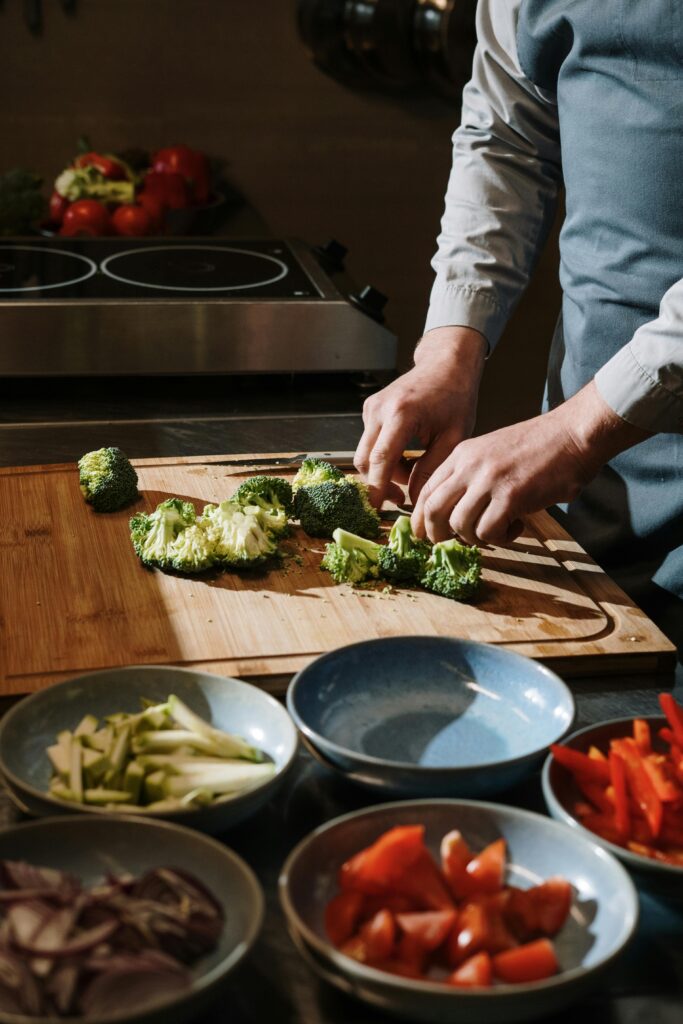If you’ve ever found yourself in a heated debate over whether to eat your broccoli raw or steamed, you’re not alone. The raw vs. cooked vegetable debate has sparked more controversy than pineapple on pizza, and the stakes are high—your gut health depends on it! But fear not, dear reader, for today we will dive deep into the digestive drama and finally answer the burning (or should we say steaming?) question: Which vegetables are better for gut health?
The Great Vegetable War: Raw vs. Cooked
Before we declare a winner, let’s set the scene. On one side, we have the raw vegetable enthusiasts, boasting their crunchy, fiber-filled wonders that retain all their natural enzymes. On the other, we have the cooked vegetable advocates, championing the benefits of breaking down tough plant fibers and enhancing nutrient absorption. It’s a battle of digestion, and only one side can reign supreme—or can they?
Vegetables Are Better When Cooked… Or Are They?
Cooking vegetables has been around since the discovery of fire, presumably because some brave soul got tired of chewing raw carrots for an hour. Cooking can make certain vegetables easier to digest and even boost their nutritional value. Take tomatoes, for example—cooking them increases the availability of lycopene, a powerful antioxidant known to reduce inflammation. Similarly, steaming spinach can reduce oxalates, making its iron more bioavailable.
However, not all cooking methods are created equal. Boiling vegetables might leave your gut microbes crying as precious water-soluble vitamins like vitamin C and folate seep into the water. Roasting and steaming, on the other hand, keep more of those gut-friendly nutrients intact.
Raw Vegetables Are Better… Or Is That a Gut Reaction?
Raw vegetables are often hailed as the ultimate gut health boosters. Packed with fiber, enzymes, and an array of antioxidants, they provide the gut microbiome with the prebiotic fuel it craves. Crunching on raw veggies also gives your jaw a workout—because who needs the gym when you’ve got a plate of raw cauliflower?
That said, not all guts are created equal. While some people thrive on a raw diet, others experience bloating, gas, and digestive distress after one too many raw kale salads. This is because certain raw vegetables contain compounds like goitrogens (which can interfere with thyroid function) and lectins (which may irritate the gut lining if consumed in excess).
Join Our Mailing List
Register now to get our hints and tips newsletter directly to your inbox
The Gut Microbiome’s Verdict – Which Vegetables Are Better?
The truth is, the answer isn’t black and white—it’s more of a lovely shade of chlorophyll green. Some vegetables are better raw, while others are better cooked, and your gut microbiome is the ultimate judge.
Raw Vegetables That Your Gut Loves
Eating raw vegetables is like throwing a party for your gut microbes—they thrive on fiber, antioxidants, and natural prebiotics. Here are some of the best raw veggies to support a happy, well-balanced gut:
Carrots – Your Gut’s Favorite Scrub Brush
Raw carrots are a fantastic source of both soluble and insoluble fiber, making them an excellent choice for gut health. The insoluble fiber acts like a broom, sweeping waste through the intestines, while the soluble fiber helps feed beneficial bacteria. Plus, their natural crunch means they stimulate digestion right from the first bite. They also contain polyacetylenes, which have antimicrobial properties that help maintain a balanced gut microbiome.
Cabbage – A Fermentation-Friendly Prebiotic Powerhouse
Raw cabbage is a gut-friendly powerhouse, rich in fiber and glucosinolates, which help the body detoxify. It also contains prebiotic fibers that nourish good bacteria, helping them multiply and support digestion. If you’re looking to enhance its gut benefits, try fermenting it into sauerkraut—this process creates probiotics that further support gut health.
Onions & Garlic – The Dynamic Duo of Gut Support
Both onions and garlic are loaded with prebiotic compounds like inulin and fructooligosaccharides (FOS), which serve as fuel for beneficial gut bacteria. Raw onions and garlic also contain allicin, a sulfur compound with antibacterial and antifungal properties. This helps prevent harmful microbes from taking over while supporting a healthy balance of good bacteria. However, if you have a sensitive stomach, consume these in moderation, as their sulfur content can sometimes lead to bloating.
Bell Peppers – A Vitamin C Boost for Your Gut Barrier
Raw bell peppers, particularly red ones, are packed with vitamin C, which strengthens the gut lining and helps protect against leaky gut syndrome. They also provide fiber and polyphenols that nourish gut bacteria. Eating them raw ensures that the vitamin C remains intact, maximizing their gut-boosting potential.
Leafy Greens – Microbe Fuel with a Side of Caution
Spinach, kale, arugula, and lettuce are fantastic for gut health because they contain special sugars called sulfoquinovose (SQ), which beneficial gut bacteria love to feast on. They also provide fiber and a variety of phytonutrients that support digestion. However, for those with sensitive stomachs, raw leafy greens can sometimes cause bloating due to their high fiber and oxalate content. If this happens, try lightly steaming them to reduce their impact on digestion.
Cooked Vegetables That Your Gut Adores
While raw vegetables offer plenty of benefits, cooking certain vegetables can unlock even more gut-friendly nutrients by breaking down tough fibers and enhancing bioavailability.
Tomatoes – Lycopene Superstars for Gut Protection
Cooking tomatoes significantly increases their lycopene content, a powerful antioxidant known for reducing gut inflammation and supporting gut lining integrity. Lycopene also acts as a prebiotic, helping beneficial bacteria thrive. To maximize absorption, cook tomatoes with a little olive oil, which helps the body absorb fat-soluble nutrients more effectively.
Spinach – More Minerals, Less Trouble
Raw spinach contains oxalates, which can interfere with calcium and iron absorption. Cooking spinach reduces these oxalates, making minerals more bioavailable. This is especially helpful for people prone to kidney stones or those who have trouble absorbing iron. Whether you sauté, steam, or add it to soups, cooked spinach ensures your gut gets the nutrients without the digestive distress.
Mushrooms – Tough Cell Walls, No More
Raw mushrooms can be tough on digestion because of chitin, a fibrous substance in their cell walls. Cooking mushrooms breaks down this chitin, making their beneficial nutrients, such as beta-glucans (which support gut immunity), more accessible. Additionally, mushrooms contain prebiotic compounds that nourish beneficial gut bacteria, making them a perfect addition to a gut-friendly meal.
Asparagus – Prebiotic Powerhouse with a Bonus Boost
Already an excellent source of prebiotic fiber, asparagus becomes even more gut-friendly when cooked. The heat softens its fibrous structure, making it easier to digest while increasing the availability of inulin, a prebiotic fiber that feeds beneficial gut bacteria. Lightly steaming or roasting asparagus ensures you retain its nutrients while making it gentler on the digestive system.
Carrots (Again? Yes, for a Good Reason!) – Beta-Carotene Bonanza
While raw carrots provide fiber and antimicrobial compounds, cooking them enhances the bioavailability of beta-carotene, a precursor to vitamin A. This antioxidant helps reduce gut inflammation and supports the integrity of the intestinal lining. Roasting, steaming, or lightly sautéing carrots can make their nutrients even more accessible to your body.
By balancing raw and cooked vegetables in your diet, you can optimize your gut health, providing your microbiome with the diverse nutrients and fiber it needs to thrive.
The Ultimate Gut-Healthy Approach – A Balanced Veggie Diet
At the end of the day, vegetables are better for gut health when you incorporate a mix of both raw and cooked varieties. Too much raw fiber can lead to bloating and discomfort, while overcooking can destroy essential nutrients. The key? Variety and preparation methods that suit your gut.
Pro Tips for Maximizing Gut Health with Vegetables
- Pair raw and cooked veggies in the same meal – Think raw bell pepper with roasted zucchini.
- Ferment your vegetables – Kimchi, sauerkraut, and pickles add beneficial probiotics to your gut.
- Use gentle cooking methods – Steaming and roasting preserve nutrients better than boiling.
- Listen to your gut – If a particular vegetable makes you feel bloated, try cooking it instead.
Conclusion: The Verdict on Raw vs. Cooked
So, which vegetables are better for gut health—raw or cooked? The answer is… both! Your gut thrives on diversity, so don’t be afraid to mix things up. A combination of raw and cooked veggies will keep your microbiome happy, your digestion smooth, and your taste buds entertained. Now, go forth and eat your greens—however you like them!




